BYD Seal U vs SsangYong Korando – Differences & prices compared
Everyday use, family trips or long-distance drives – here’s where the differences show.
Discover whether BYD Seal U or SsangYong Korando fits your lifestyle better.
Costs and Efficiency: Price and efficiency are key factors when choosing a car – and this is often where the real differences emerge.
SsangYong Korando has a evident advantage in terms of price – it starts at 27000 £, while the BYD Seal U costs 34300 £. That’s a price difference of around 7286 £.
Fuel consumption also shows a difference: BYD Seal U manages with 0.40 L and is therefore convincingly more efficient than the SsangYong Korando with 7.50 L. The difference is about 7.10 L per 100 km.
In terms of energy consumption, the advantage goes to the SsangYong Korando: with 16.80 kWh per 100 km, it’s somewhat more efficient than the BYD Seal U with 19.90 kWh. That’s a difference of about 3.10 kWh.
As for range, the BYD Seal U performs distinct better – achieving up to 500 km, about 161 km more than the SsangYong Korando.
Engine and Performance: Under the bonnet, it becomes clear which model is tuned for sportiness and which one takes the lead when you hit the accelerator.
When it comes to engine power, the BYD Seal U has a convincingly edge – offering 324 HP compared to 190 HP. That’s roughly 134 HP more horsepower.
In acceleration from 0 to 100 km/h, the BYD Seal U is decisively quicker – completing the sprint in 5.90 s, while the SsangYong Korando takes 8.40 s. That’s about 2.50 s faster.
In terms of top speed, the SsangYong Korando performs slight better – reaching 191 km/h, while the BYD Seal U tops out at 180 km/h. The difference is around 11 km/h.
There’s also a difference in torque: BYD Seal U pulls noticeable stronger with 550 Nm compared to 360 Nm. That’s about 190 Nm difference.
Space and Everyday Use: Beyond pure performance, interior space and usability matter most in daily life. This is where you see which car is more practical and versatile.
Both vehicles offer seating for 5 people.
In curb weight, SsangYong Korando is evident lighter – 1517 kg compared to 1940 kg. The difference is around 423 kg.
In terms of boot space, the BYD Seal U offers slight more room – 552 L compared to 551 L. That’s a difference of about 1 L.
In maximum load capacity, the BYD Seal U performs to a small extent better – up to 1465 L, which is about 217 L more than the SsangYong Korando.
When it comes to payload, SsangYong Korando somewhat takes the win – 463 kg compared to 410 kg. That’s a difference of about 53 kg.
Who comes out on top?
Overall, the BYD Seal U shows itself to be dominates this comparison and secures the title of DriveDuel Champion.
It convinces with the more balanced overall package and proves to be the more versatile choice for everyday use.
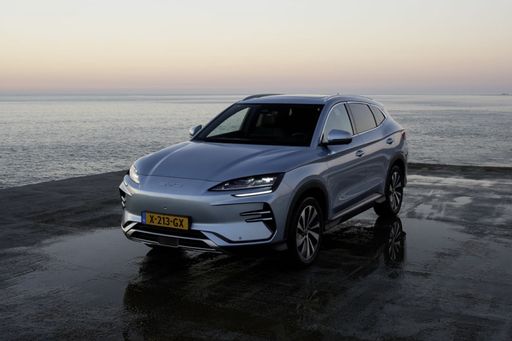
BYD Seal U
BYD Seal U
The BYD Seal U presents itself as a sophisticated addition to the electric vehicle market, blending sleek design with cutting-edge technology. Its modern aesthetic is complemented by a spacious interior, offering both comfort and functionality for drivers and passengers alike. With advanced features prioritising sustainability and performance, it represents a bold step forward in eco-friendly motoring.
details @ press.bydauto.be
@ press.bydauto.be
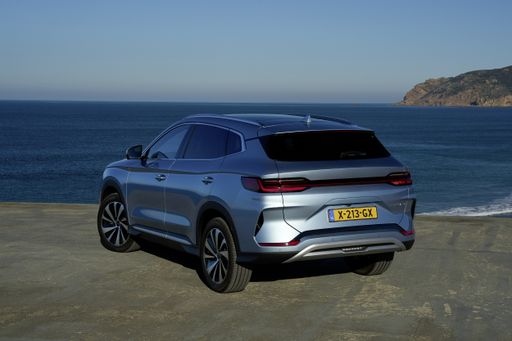 @ press.bydauto.be
@ press.bydauto.be
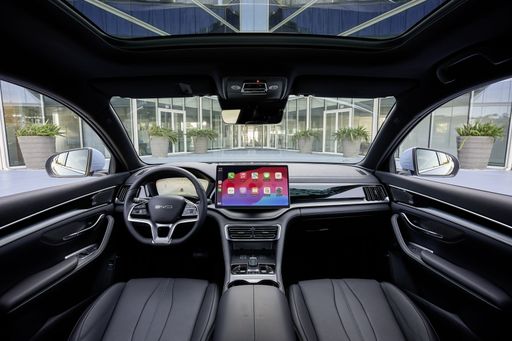 @ press.bydauto.be
@ press.bydauto.be
SsangYong Korando
The SsangYong Korando offers a blend of contemporary design and practicality, making it an appealing choice for urban adventurers. Its spacious interior and comfortable seating ensure a pleasant driving experience for both driver and passengers. With its reliable performance and advanced features, the Korando stands out in the competitive SUV market.
details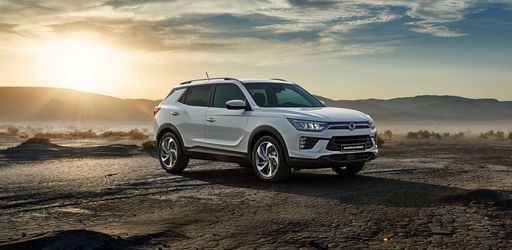 @ Ssangyong
@ Ssangyong
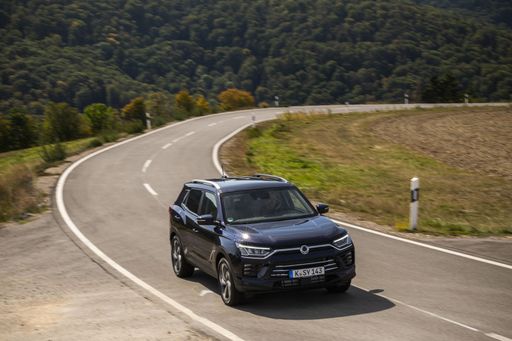 @ Ssangyong
@ Ssangyong
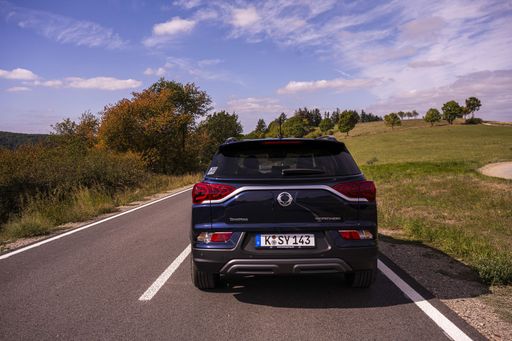 @ Ssangyong
@ Ssangyong
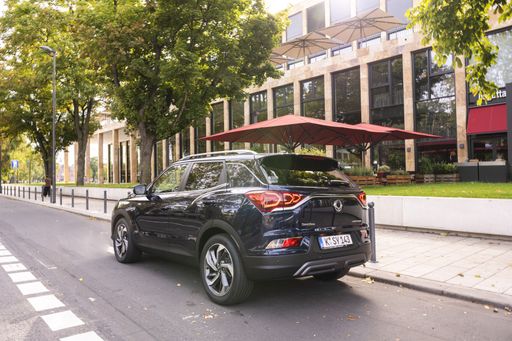 @ Ssangyong
@ Ssangyong
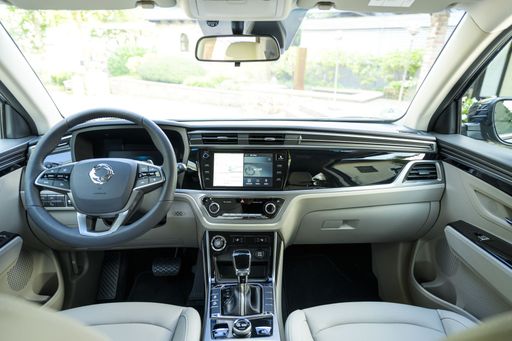 @ Ssangyong
@ Ssangyong

|

|
|
|
|
Costs and Consumption |
|
|---|---|
|
Price
34300 - 39800 £
|
Price
27000 - 42000 £
|
|
Consumption L/100km
0.4 - 1.2 L
|
Consumption L/100km
7.5 - 8.6 L
|
|
Consumption kWh/100km
19.9 - 20.5 kWh
|
Consumption kWh/100km
16.80 kWh
|
|
Electric Range
70 - 500 km
|
Electric Range
339 km
|
|
Battery Capacity
-
|
Battery Capacity
-
|
|
co2
0 - 26 g/km
|
co2
0 - 197 g/km
|
|
Fuel tank capacity
60 L
|
Fuel tank capacity
50 L
|
Dimensions and Body |
|
|---|---|
|
Body Type
SUV
|
Body Type
SUV
|
|
Seats
5
|
Seats
5
|
|
Doors
5
|
Doors
5
|
|
Curb weight
1940 - 2147 kg
|
Curb weight
1517 - 1840 kg
|
|
Trunk capacity
425 - 552 L
|
Trunk capacity
551 L
|
|
Length
4775 - 4785 mm
|
Length
4450 - 4465 mm
|
|
Width
1890 mm
|
Width
1870 mm
|
|
Height
1668 - 1670 mm
|
Height
1620 - 1645 mm
|
|
Max trunk capacity
1440 - 1465 L
|
Max trunk capacity
1248 L
|
|
Payload
410 kg
|
Payload
410 - 463 kg
|
Engine and Performance |
|
|---|---|
|
Engine Type
Plugin Hybrid, Electric
|
Engine Type
Petrol, Electric
|
|
Transmission
Automatic
|
Transmission
Manuel, Automatic
|
|
Transmission Detail
CVT, Reduction Gearbox
|
Transmission Detail
Manual Gearbox, Automatic Gearbox, Reduction Gearbox
|
|
Drive Type
Front-Wheel Drive, All-Wheel Drive
|
Drive Type
Front-Wheel Drive, All-Wheel Drive
|
|
Power HP
218 - 324 HP
|
Power HP
163 - 190 HP
|
|
Acceleration 0-100km/h
5.9 - 9.6 s
|
Acceleration 0-100km/h
8.40 s
|
|
Max Speed
170 - 180 km/h
|
Max Speed
156 - 191 km/h
|
|
Torque
300 - 550 Nm
|
Torque
260 - 360 Nm
|
|
Number of Cylinders
4
|
Number of Cylinders
4
|
|
Power kW
160 - 238 kW
|
Power kW
120 - 140 kW
|
|
Engine capacity
1497 - 1498 cm3
|
Engine capacity
1497 cm3
|
General |
|
|---|---|
|
Model Year
2024
|
Model Year
2021 - 2023
|
|
CO2 Efficiency Class
B, A
|
CO2 Efficiency Class
F, G, A
|
|
Brand
BYD
|
Brand
SsangYong
|
What drive types are available for the BYD Seal U?
The BYD Seal U is available as Front-Wheel Drive or All-Wheel Drive.
The prices and data displayed are estimates based on German list prices and may vary by country. This information is not legally binding.
